1574 From Kelowna to Casablanca
Meet Me in Cairo: Tales of Hitchin’ in the ’60s
by Jim Kerr
Vancouver: Granville Island Publishing, 2022
$26.95 / 9781989467527
Reviewed by Howard Macdonald Stewart
*
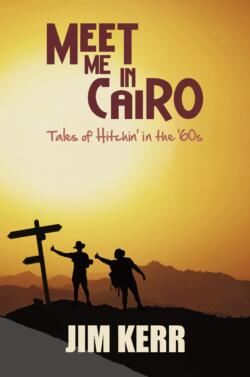 Jim Kerr’s story of hitch hiking around North America, Europe, North Africa, and the Levant is truly a tale from another age. An era when one could count on the kindness of strangers to safely move you across thousands of miles, while you lived on two dollars a day.
Jim Kerr’s story of hitch hiking around North America, Europe, North Africa, and the Levant is truly a tale from another age. An era when one could count on the kindness of strangers to safely move you across thousands of miles, while you lived on two dollars a day.
The author dropped out of UBC after his first year of engineering and talked Blair Campbell, a hitchhiking buddy back home in Kelowna, into joining him on a multi-continent odyssey in a distant time when hitchhiking was a viable and popular means of international travel. Kerr would later train in economics and accounting. That perhaps explains the wealth of arcane detail provided. Between 26 June 1964 and 17 March 1965, he spent an average of $2.06 per day. With his statistical eye he even added up his rides: an astonishing 1,459 of them in under nine months, or about five rides a day.

We learn many tricks of the trade that enabled the two to spend so little while going so far. Carefully researched ahead of time, “lost relatives” in the UK were good for a couple of weeks of free overnight stays. Kerr and his tillicum also cultivated pen pals for the same purpose, and these provided another couple of weeks of free overnights, often with generous meals. Later, a week’s worth of free accommodation was found in various congenial North African jails. Kerr even financed a couple of weeks of travel by selling his blood. Then there were the blankets they stole from cheap hotels, each worth another night or two’s accommodation down the road. And the business they briefly took away from local street artists, by copying their shtick.
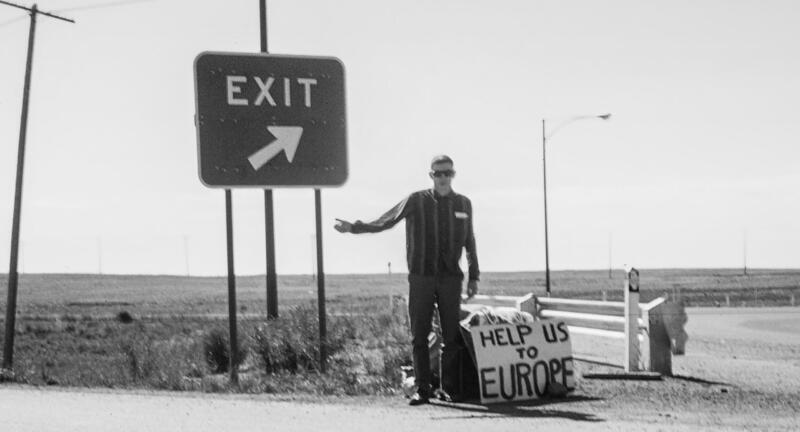

Their many travel financing innovations allowed them to wander around Britain, Scandinavia, and western Europe, with a brief sojourn in Cold War Berlin, before heading across the Strait of Gibraltar for North Africa, where they hitched from Morocco to Egypt. I was set to wax indignant about their blanket theft and street art gambit in the Maghreb until I remembered my own shameful transgressions while wandering through Mexico some years later. But Kerr’s early travels were also different from my own. His parents adamantly opposed the whole expedition, assuring him it would likely ruin his life. They were greatly relieved when he made it home alive. I don’t remember my father expressing much opinion about my early travels, before or after. But then I was a fourth child and he had other things to worry about.
Kerr assures us that hitch hiking, because it’s “free flowing, flexible, and liberating,” just might be superior to all other modes of travel. If hitchhiking weren’t so sedentary I might agree with him. Of course, bicycling is the superior way to see the world, but hitchhiking certainly has much to commend it, as Kerr reveals in his tales. Its spontaneity is a great virtue. Hitching also draws upon a deep well of kindness among strangers while exposing the traveller to a vast diversity of other people who just happen to be moving in the same direction as you, and have room in their vehicles.
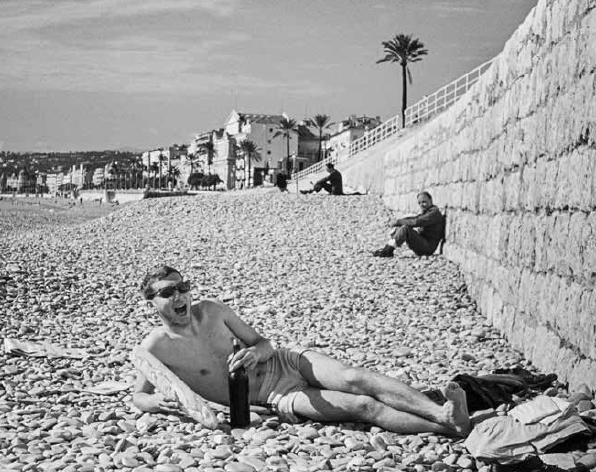

I didn’t think much of the hotel blanket and street art scams, nor the used car dealer tactics they adopted for unloading a decrepit old Saab picked up on an impulse in Sweden (was this car dealer shtick something they picked up in the Social Credit heartland of the central Okanagan?). I much admired some of Kerr’s other innovations though. On the ship that carried them across the Atlantic, for example, they learned to harvest copious volumes of wine left behind at the tables by other diners. In Amsterdam, they were able to swill free beer at the Heineken brewery for a couple of days before being proscribed.
The author set off at nineteen, an age at which he describes himself as a “naïve young man.” It’s probably not surprising then, that the book doesn’t offer much introspection, analysis, or reflection about the places he passed through. The result is that many places rich in history, places like Berlin and Istanbul, get remarkably superficial treatment. The only commentary, for example, on the disastrous civil war that would break out in Beirut a decade after their visit, was about the father of a future basketball star who would be murdered there. Kerr does mention the various hatreds that prevailed among different nationalities in the eastern Mediterranean but doesn’t delve into these in any serious way, other than to recognise that Palestinians seemed to have some good reasons to be dissatisfied with their lot.


The places he saw and people he met there do not appear to have played much role in Kerr’s life back in Canada, so why would he delve further? After all, he wasn’t a historian and he was very young. His breezy treatment of complicated places and their people is what one could expect from a teenager raised in a small town in the BC interior and travelling for adventure in the mid-1960s. What Kerr offers instead is a straightforward, well-written travel saga that involves a steady stream of colourful passersby, graphic details of the extreme parsimony that teenagers can be so good at when they have to, and the amazing displays of kindness and generosity shown to these adventurous young globetrotters from Kelowna.
*
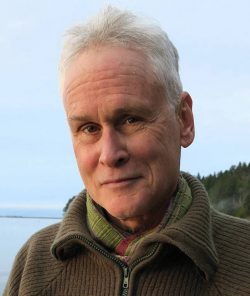
Howard Macdonald Stewart is an historical geographer and semi-retired international consultant whose work has taken him to more than seventy countries since the 1970s. His memoir of a youthful bicycle trip down the Danube with war hero and debonair cyclist Cornelius Burke, Bumbling down the Danube, was published in The British Columbia Review in 2016, and his memoir, The Year of the Bicycle: 1973, followed in 2020. He is also the author of the award-winning Views of the Salish Sea: One Hundred and Fifty Years of Change around the Strait of Georgia (Harbour, 2017), as well as a popular Remembrance Day reflection, Why the red poppies matter. He has lived on Denman Island, off and on, for more than thirty years. He is now writing an insider’s view of his four decades on the road that followed his perambulations of 1973, notionally titled Around the World on Someone Else’s Dime: Confessions of an International Worker. Editor’s note: Howard Stewart has recently reviewed books by John Boyko. Andrew Scott, Catherine Nolin & Grahame Russell, Howard White, and Wade Davis for The British Columbia Review.
*
The British Columbia Review
Publisher and Editor: Richard Mackie
Formerly The Ormsby Review, The British Columbia Review is an on-line journal service for BC writers and readers. The Advisory Board consists of Jean Barman, Wade Davis, Robin Fisher, Cole Harris, Hugh Johnston, Kathy Mezei, Patricia Roy, Maria Tippett, and Graeme Wynn. Provincial Government Patron (since September 2018): Creative BC. Honorary Patron: Yosef Wosk. Scholarly Patron: SFU Graduate Liberal Studies.
“Only connect.” – E.M. Forster
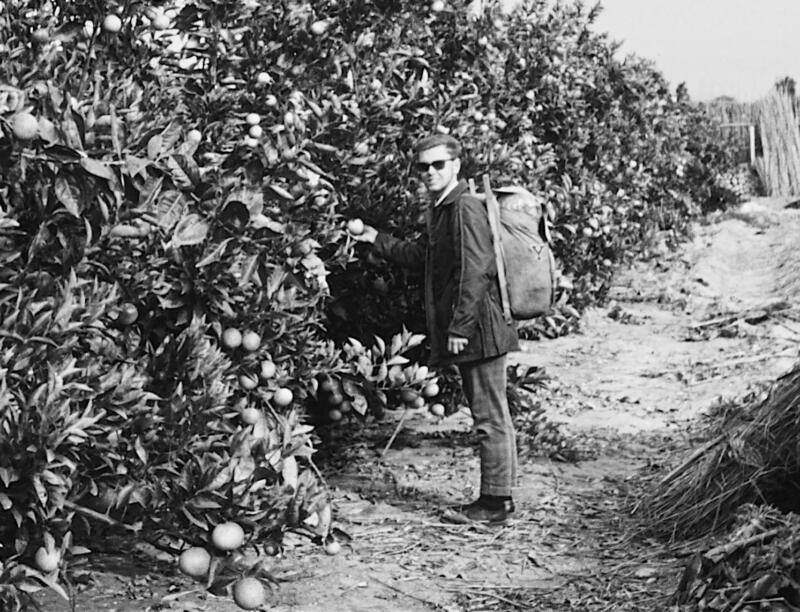
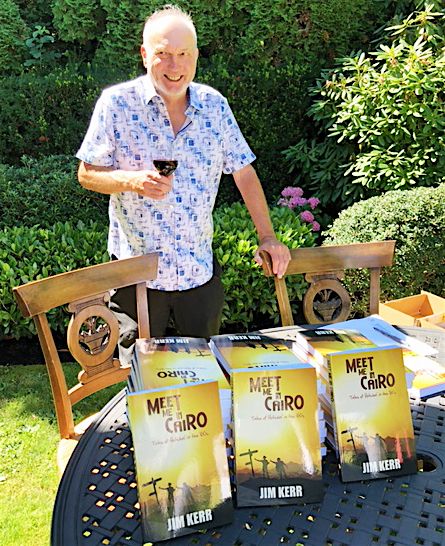
4 comments on “1574 From Kelowna to Casablanca”